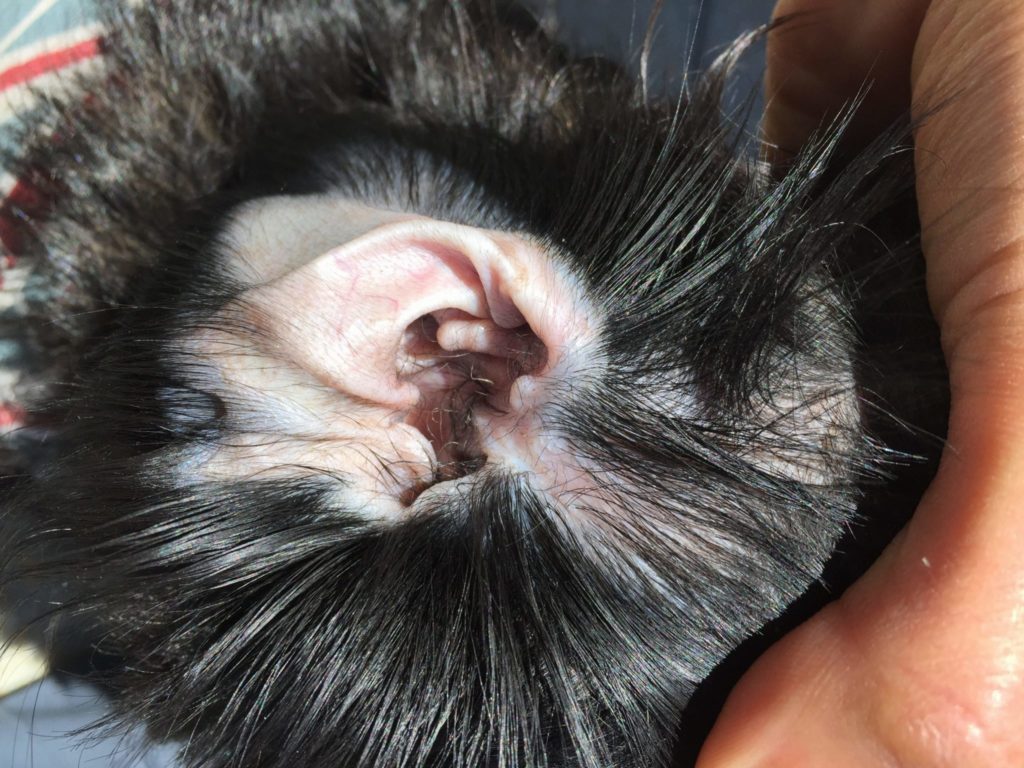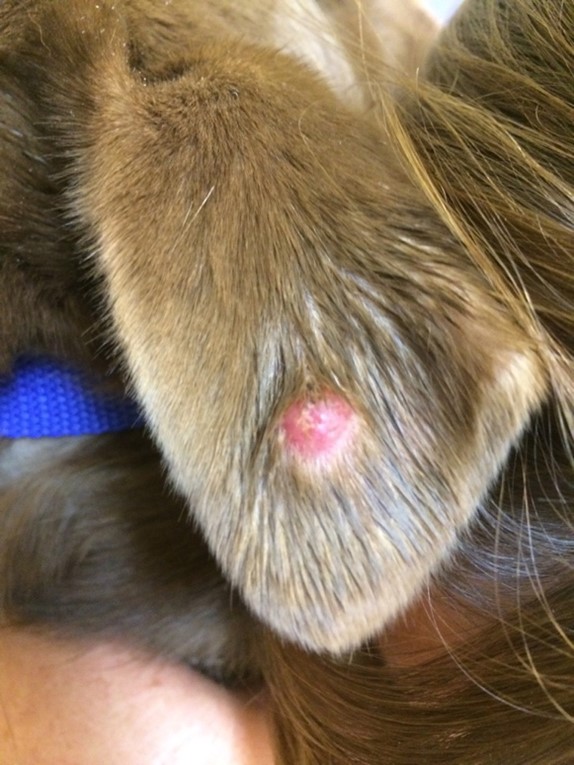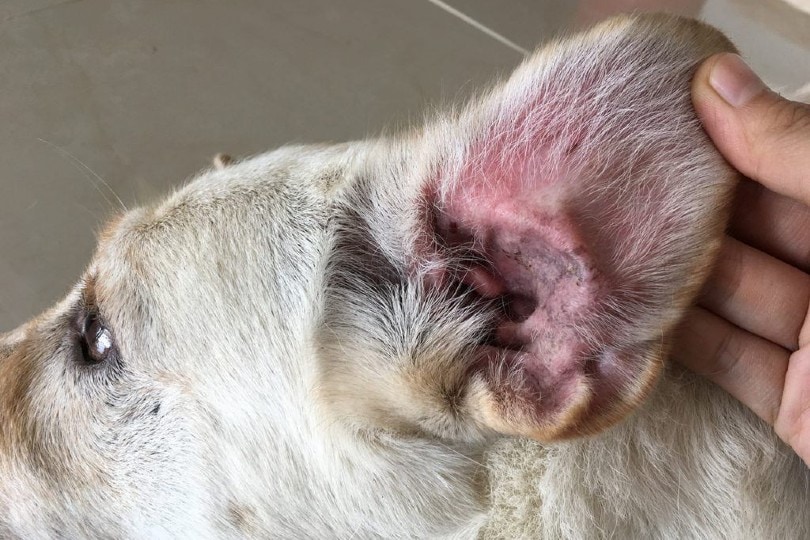
How to Recognize and Treat Ear Mites in Dogs Canine Campus Dog
The most common clinical signs in pets with ear canal tumors include an inflamed, itchy, and painful ear, persistent smelly discharge (that can be waxy, pus-filled, or bloody), head shaking, and ear scratching. Sometimes pets will shake or scratch hard enough to cause an ear hematoma (a blood blister).

Can Dogs Get Tumors On Their Ears
Ear tumors in dogs are abnormal growths that can develop in any part of the ear canal. However, in dogs, tumors of the ear canal are more common in the outer than in the middle ear or inner ear. Ear tumors in dogs can be benign tumors or malignant tumors. Generally speaking, benign tumors in the ears are more common than malignant ones.

Ear Cancer in Dogs Symptoms, Causes, Diagnosis, Treatment, Recovery
Stumbling or falling due to lack of balance Tilting the head Swelling of the ear Scratching or rubbing the ear Whining or crying in pain when ear is touched Foul smell in the ear Bloody or yellow discharge Chronic ear infections Types

Are Ear Tumors In Dogs Common
Ear canal tumors may arise from any of the tissues lining or supporting the ear canal, including the squamous epithelium, the ceruminous or sebaceous glands, or the mesenchymal tissues. Malignant tumors arising from the external ear canal and pinna are more common in cats than in dogs.

Ear infections in Dogs Tips on Prevention and Treatment My Vet
Ceruminous gland tumors are best visualized in a clean ear using a video otoscope. These tumors may be pedunculated or broad based and are smooth or multilobulated in appearance. In breeds other than the American Cocker Spaniel, these tumors are often primarily in the vertical ear canal. In the American Cocker Spaniel, these tumors can be found.

Xclean a dogs ear silopemed
Ear tumors in dogs are a reason to seek immediate veterinary attention. While not all ear growths are cancerous, early detection and treatment are crucial for your dog's well-being. This comprehensive guide will walk you through the types, causes, diagnosis, and treatment options for ear tumors in dogs.

Dog Ear Flap Issues Cysts, Lumps & Bumps [With Pictures]
Ear tumors in dogs are any abnormal growths on or within the ear of the dog. Benign tumors tend to grow slowly and don't spread (metastasize). Malignant tumors grow rapidly, invade local tissues, and sometimes metastasize. Ear cancer refers to the subset of ear tumors that are malignant. Not all ear tumors are cancerous, but all ear cancers.
My dog has a lump on the inside of his ear. It's very reddish and is
The trusted provider of veterinary information since 1955. A A A. A A A

5 Dogs Prone to Ear Infections VetReviewed Facts & Signs Pet Keen
What Is Ceruminous Gland Adenocarcinoma in Dogs? Ceruminous gland adenocarcinoma is a rare cancerous (malignant) tumor that originates from the sweat glands found in the external auditory canal of a dog's ear.
:max_bytes(150000):strip_icc()/hematoma-of-the-ear-flap-178456210-126c031af46f4846b253bf79e58d0ec2.jpg)
Common Ear Problems in Dogs
Ear tumors are growths associated with the dog's ear and the most common include ceruminous gland adenoma or adenocarcinoma, sebaceous gland tumor and basal cell tumor. Depending on the tumor type there may or may not be an underlying cause. Chronic inflammation may predispose tumor formation. Ceruminous gland adenocarcinoma.

Ear Mites in Dogs Symptoms and Treatment Your Pet Insured
Veterinary Network 37.1K subscribers 1.9K views 11 months ago 📌 If your dog has an ear tumor, it may be asymptomatic until he grows enough to cause symptoms or until it's visible. Most ear tumors.

My dog looks like she has a Hemotoma in her ear flap. It’s a small
Most ear tumors are polyp-like, and can attach by a narrow base to the outer layer of skin, the glands that produce earwax and oil, or even the bones, connective tissues and muscles. Malignant tumors are more common than benign, but either can develop and appear more often in middle-aged or older dogs.

Small Button Size Circular Tumor on Dog's Ear YouTube
An ear tumor is a growth, benign or malignant, that develops out of any of the tissues associated with the ear canal. Benign tumors tend to stay in the same location and don't spread to other body parts. Malignant tumors can spread to other body parts and organs, like the lungs, liver, and lymphatic system. Video of the Day
bumps on the ear Boxer Breed Dog Forums
Both benign and malignant tumors can arise from these glands and are the most common type of tumors within the ear canal. Additional tumor types that have been reported include; squamous cell carcinoma, carcinomas, fibromas, papillomas, hemangiosarcoma, mast cell tumors, melanomas, sebaceous glands and more.

Sebaceous Cyst Drainage Dog Best Drain Photos
Types of Ear Tumors in Dogs and Cats Ceruminous Gland Adenoma (Benign Ear Wax Gland Tumors) Ceruminous Gland Adenocarcinoma (Malignant Ear Wax Gland Tumors) Nasopharyngeal Polyps (Inflammatory Polyps) Squamous Cell Carcinoma

Ear Mites in Dogs Symptoms, Causes, Diagnosis, Treatment, Recovery
Signs of ear canal tumors include ear discharge (waxy, pus-filled, or bloody) in one ear, a foul odor, head shaking, ear scratching, and swelling or draining abscesses near the ear. If the middle or inner ear is involved, the dog may have loss of balance and coordination, deafness, head tilt, and other neurologic signs.
